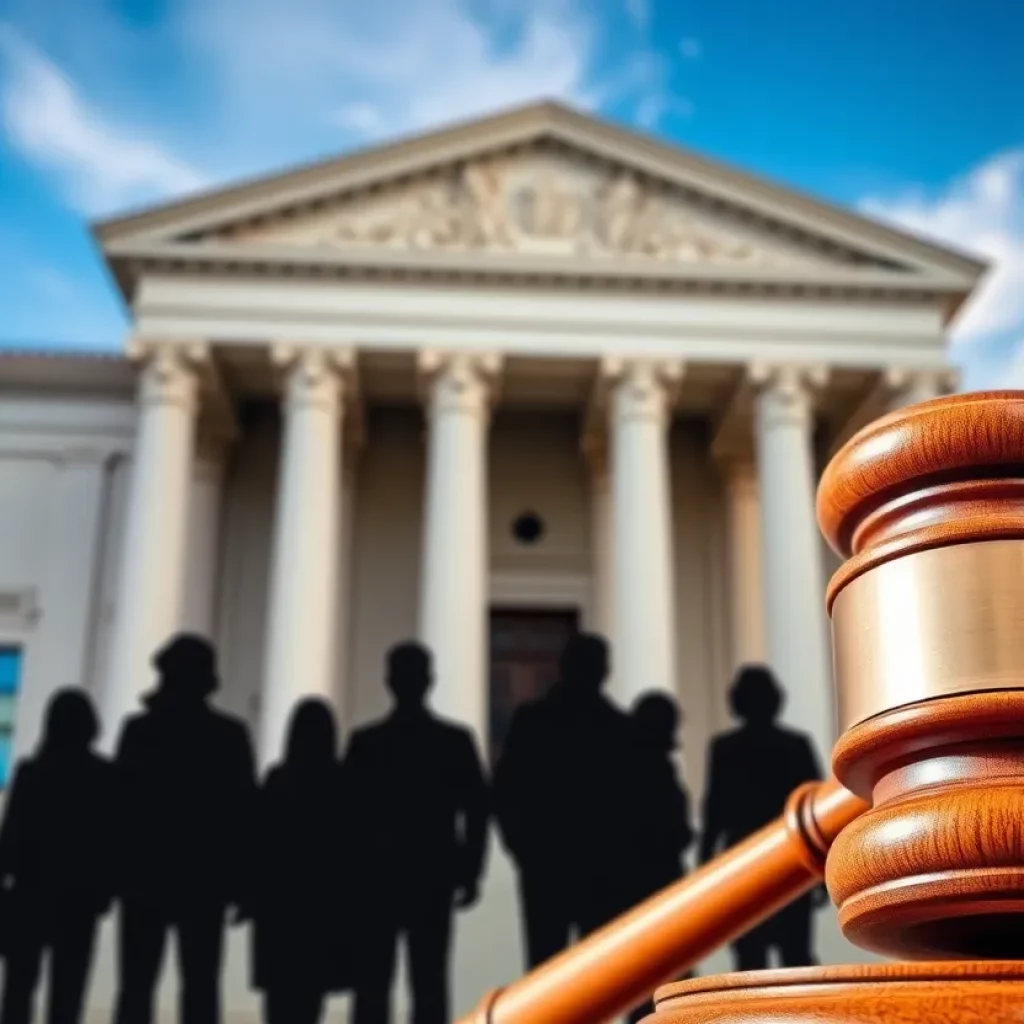News Summary
Former President Donald Trump has raised concerns about the constitutional rights of immigrants, particularly their due process rights, as his administration seeks to implement the largest deportation operation in U.S. history. Amid legal challenges, his comments contradict established rights upheld by the Supreme Court, raising alarms about the implications for all individuals in the U.S. as the administration pushes for immediate deportations linked to gang affiliations without traditional judicial oversight.
Trump’s Deportation Plans Clash with Constitutional Rights
In a recent interview, former President Donald Trump raised eyebrows by questioning whether immigrants possess rights to due process under the Constitution. This comes at a time when his administration aims to launch what it has labeled the largest deportation operation in U.S. history, a central tenet of Trump’s 2024 campaign.
Administration’s Push for Immediate Deportations
The current administration is pressing for legal permissions that would allow for the immediate deportation of immigrants alleged to be gang members, potentially circumventing the process of allowing these individuals to plead their case. In making these assertions, Trump has suggested that adherence to due process would significantly delay the process, proposing the need for “a million or 2 million or 3 million trials” to handle the legal ramifications appropriately.
Despite the Constitution’s Fifth Amendment clearly stating that “no person” should be deprived of life, liberty, or property without that essential due process, Trump’s comments indicate a troubling uncertainty about these established rights. The Supreme Court has previously upheld the principle that noncitizens are granted certain basic rights, including the right to due process in immigration matters, yet Trump’s dismissal of this concept raises profound questions about the future of such protections.
A Challenge to Established Judicial Norms
The administration’s push to expedite deportations has not been without legal challenges. Recently, the Supreme Court mandated that individuals facing deportation be allowed to appear before an immigration judge, reinforcing the necessity of judicial oversight in these matters. Nevertheless, the administration has been accused of resisting court orders related to due process, fueling allegations of noncompliance.
The invocation of the rarely used Alien Enemies Act from 1798 to expedite deportations linked to alleged gang affiliations has only intensified the ongoing legal and ethical debates. Challenges to this move have resulted in several Supreme Court decisions which reaffirmed due process rights for potentially affected individuals, showcasing the judiciary’s role in maintaining constitutional protections.
Real-World Implications
One striking example involves Kilmar Abrego Garcia, who was mistakenly deported back to El Salvador despite a standing court order preventing his removal. Following this incident, the administration acknowledged it had made an “administrative error” and faced a Supreme Court ruling mandating Garcia’s return, allowing him to present his case. However, Trump indicated that the administration lacked the power to facilitate Garcia’s repatriation, diverting further responsibility to the attorney general.
This situation points to a broader concern over how the administration handles cases of deported individuals, especially amid allegations that it is attempting to bypass legal safeguards designed to protect due process. Legal experts emphasize that the right to due process is fundamental and extends to everyone within U.S. borders, irrespective of their immigration status.
Judicial Concerns and Erosion of Rights
Federal judges nationwide have increasingly vocalized concerns regarding the erosion of due process rights, warning that failure to uphold these principles may create vulnerabilities for all individuals, including U.S. citizens. Legal analysis indicates that neglecting due process for immigrants not only infringes on established rights but could further erode judicial integrity and public confidence in the legal system.
Advisers within Trump’s circle, such as Stephen Miller, have made claims suggesting that undocumented immigrants should not be granted due process. These assertions starkly contradict longstanding legal precedents affirming immigrant rights, further complicating the legal landscape surrounding immigration enforcement.
Conclusion: A Dangerous Precedent?
The administration’s aggressive approach to immigration, coupled with its attempts to undermine established legal protections, has ignited fierce criticism from legal advocates and immigrant rights organizations. As ongoing cases highlight the struggle over due process rights and immigration enforcement, there are growing fears that current practices could establish dangerous precedents for all individuals residing in the United States.
As the legal battles continue, the outcomes will likely have long-lasting ramifications not only for immigrants but also for the very fabric of American justice.
Deeper Dive: News & Info About This Topic
HERE Resources
Stormy Legal Seas: Trump’s Executive Actions Under Fire
Lawyer Questions Deportation of U.S. Citizen Children
The Importance of Personal Injury Lawyers in Sachse
Major Overhaul in Florida’s Personal Injury Laws: What Lawyers Should Know
Lawyer Questions Trump’s Views on Due Process in Deportation Case
Lawyer Advocates for Rights of Deported Young U.S. Citizens
Lawyer Raises Concerns Over Deportation of U.S. Citizen Children
International Students’ Legal Status Restored Amid Challenges
New U.S. Guidelines Unsettle International Students
Columbia Student and Activist Released from Immigration Detention
Additional Resources
- Politico: Trump’s Deportation Plans Clash with Constitutional Rights
- Wikipedia: Due Process
- Reuters: Trump Administration’s Immigration Strategy
- Encyclopedia Britannica: Due Process
- Google Search: Trump administration due process rights
Author: STAFF HERE CHARLESTON
The CHARLESTON STAFF WRITER represents the experienced team at HEREcharleston.com, your go-to source for actionable local news and information in Charleston, Charleston County, and beyond. Specializing in "news you can use," we cover essential topics like product reviews for personal and business needs, local business directories, politics, real estate trends, neighborhood insights, and state news affecting the area—with deep expertise drawn from years of dedicated reporting and strong community input, including local press releases and business updates. We deliver top reporting on high-value events such as the Spoleto Festival USA, Charleston Wine + Food Festival, and the MOJA Festival. Our coverage extends to key organizations like the Charleston Metro Chamber of Commerce and the Charleston Museum, plus leading businesses in tourism and maritime industries that power the local economy such as South Carolina Ports Authority and the Charleston Visitor Center. As part of the broader HERE network, including HEREaiken.com, HEREbeaufort.com, HEREchapin.com, HEREcharleston.com, HEREclinton.com, HEREcolumbia.com, HEREgeorgetown.com, HEREgreenwood.com, HEREgreenville.com, HEREhiltonhead.com, HEREirmo.com, HEREmyrtlebeach.com, HEREnewberry.com, HERErockhill.com, HEREspartanburg.com, HEREaustin.com, HEREcollegestation.com, HEREdallas.com, HEREhouston.com, and HEREsanantonio.com, we provide comprehensive, credible insights into South Carolina's dynamic landscape.










